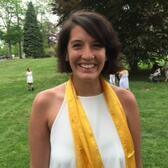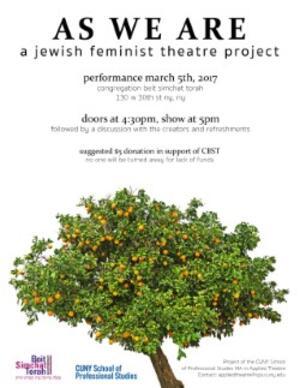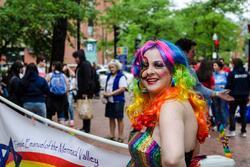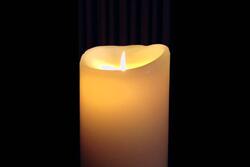As We Are: A Jewish Feminist Theatre Project
As We Are: A Jewish Feminist Theatre Project critically examines the aspects of Judaism that are tied to patriarchy, limiting representation of women and femme people. Femme is a personal identity descriptor used by people who are lesbian, gay, bisexual, trans, queer, or gender nonconforming/genderqueer. Femmes reclaim aspects of femininity that they wish to embrace and/or subvert, without compromising the parts of themselves that are strong, brave, loud, and even radical. Working in partnership with LGBTQ+ Congregation Beit Simchat Torah and with the Jewish, community-centered service corps, Repair the World, As We Are aims to celebrate the identities and experiences of its participants, specifically as Jewish women and femme people.
In this interview, the three co-directors, Rose Ginsberg, Allison Lerman-Gluck, and Ariel Warmflash, reflect on how As We Are came to be, their own relationship with Judaism, and the power of bringing people together to reimagine traditional narratives.
How did this project take shape?
Allison: Growing up as the daughter of a Reconstructionist rabbi in a feminist and humanistic Jewish environment, I still struggled to find a spiritual home and religious practice for myself within texts that were male-centric and that defined God as ‘king’ and ‘father.’ After a move to Albany, I spent a year in a public school, where I was the only Jewish person, and where I was tormented by my non-Jewish classmates. My parents transferred me to an all-Jewish private school. There, instead of getting teased and bullied for being Jewish, I was teased and bullied, partially for not being Jewish enough.
Now, at 26 years old, I have a complicated relationship to Judaism. Judaism is a patriarchal religion. I have only encountered a few Jewish environments that make me feel seen and held as a queer, femme, woman. For me, this project is, in part, an effort to create connection and community between femmes and women who might feel similarly to me; we want to be a part of a Judaism that is for and by us, even if we are still figuring out what that could look like.
Rose: From my bat mitzvah to my late 20s, I had very little relationship to Judaism. I celebrated Hanukkah and Pesach with my immediate family, and sometimes bought a round Challah for the new year, but that was it. This distance was partly because I had never felt embraced by the Jewish community I grew up in, outside of my family. That sense of alienation, combined with a general rebellion against organized religion, drove me away from Judaism for over a decade.
In my twenties, I became friends with a diverse group of women from all across the country, in which I was the only Jewish person. Suddenly, as loved and accepted as I felt by my friends, I also felt very Jewish–– I felt my worldview was fundamentally different from theirs. Discovering exactly what this difference was and where it came from started me on a path towards examining what Judaism means to me, how it has shaped who I am, and how I want it to be present in my daily life.
Ari: I grew up in a world that I now affectionately refer to as my “Jewish bubble”. This world was comprised of my synagogue, and my Jewish Day School, which was on the same campus where my conservative Rabbi father also worked. It was a bubble–– safe, but sometimes smothering. When I left home and saw how expansive the tradition was, I began my personal exploration to craft the practice that felt right for me. This project presents itself at a time when the world feels so in flux; finding time once a week to gather in community and think about the interplay of gender, identity, and tradition in Jewish practice is such a special way to continue exploring my own complicated relationship to Judaism.
How are you exploring these ideas of identity and tradition in As We Are?
Allison: Through movement-based exercises, a process called Moment Work (credit to Tectonic Theater Project), improvisation, monologue-writing, and group ritual building, we ask participants to reflect on their experiences of Judaism—both positive and negative—and to create short vignettes that either highlight a place where they have felt pushed out or illuminate an opportunity for reclamation or creation of new traditions.
For example, participants wrote monologues from the prompts: Share the story of your relationship to Judaism as a young person. Share a story of how that shifted or what happened that changed how you felt/saw/understood your Judaism. How was your relationship to Judaism different afterwards? From there, we asked participants to pair up and create a duet out of their two pieces. This could either highlight the differences between their experiences or the similarities. These pieces now comprise a hearty section of our performance piece!
How have participants responded to being a part of this project?
Allison: Participants have responded so positively. Every week, the sessions feel like a breath of fresh air. There is clearly a need for this work and the space feels holy when we’re working together. One participant shared that she uses this space for personal reflection, and that, prior to this project, she hadn’t given herself space to explore being a Jewish woman. She went on to say, “It’s been lovely to open myself up to people who have different relationships with Judaism, and it’s been helpful to understand how Judaism plays a role in their lives.” Another participant shared that they have been pleasantly surprised by “how much action I feel in nothing but reflection” throughout the process. The whole project has been about building a positive and supportive space to rely on during a very uncertain and scary time.
Rose: I’m so happy and proud to see how the participants have taken ownership of our space and our work together. This project doesn’t just belong to us; it belongs to them, because they’ve made it their own. They ask the questions they’re curious about and bring the ideas into the room that they want to pick apart. There is a wonderful atmosphere of joy, camaraderie, and active consent for which I am intensely grateful.
What has surprised you in the course of this project?
Allison: I’ve been surprised by how trusting the participants are of the project and of the facilitators. Participants go with the flow of the sessions that we plan for them, despite the fact that they can’t necessarily see the structure of the final piece from the work that we’ve been doing week to week. They also offer push back when they are confused or when they disagree with something that is said or done. One example of this is in our project name change. Some participants voiced that the original name of the project (The Jewish Femme and Female Theatre Project) did not feel representative of their identities. Some connected to this project through the word “femme,” and some connected to this project from the perspective of being a woman, but the word “female,” with its biological implications, felt reductive.
To create a fully intentional space and one that belonged to all the co-creators, we collectively brainstormed and agreed on our new title. The root of “As We Are” comes from one of the names for the Divine, “I Will Be As I Am.” It also appears in a poem by Marge Piercy, one of our artistic inspirations.
Rose: I was surprised to see just how quickly our participants came together not just as a working ensemble but as a community. Consent is central to building trust, so they ask each other everything from “Is it okay if I touch your shoulder in this moment?” to “Are you comfortable sitting on the floor?” to “Are you cool focusing on this theme for this activity?” A sense of trust permeates our sessions. The applause and enthusiasm every time anyone shares a moment or a scene they’ve been working on is huge. There’s a lot of love in the space, which you don’t always see as a facilitator. It’s amazing.
Ari: When people want something, they show up. I have spent a lot of time as a facilitator holding my breath hoping that participants arrive at a workshop. From the first session of this project, we have had between eight and fifteen people in the room each time, and it is because seeking and building community means as much to them as it does to us. I’m not surprised that the project has been successful, but I am delighted that we have found a medium that inspired folks to want to come out on a Thursday night and spend a couple of hours making art and talking about our world.
As We Are: A Jewish Feminist Theatre Project
Join us for a performance followed by a dialogue with the co-creators and a nosh!
Sunday, March 5th
Doors at 4:30PM, Performance at 5PM
Congregation Beit Simchat Torah 130 West 30th Street, New York, NY
Suggested donation of $5 to benefit our host, CBST. (No one will be turned away for lack of funds.)
This is part of a thesis research project for the MA in Applied Theatre at the CUNY School of Professional Studies. Email appliedtheatre@sps.cuny.edu for more info.







